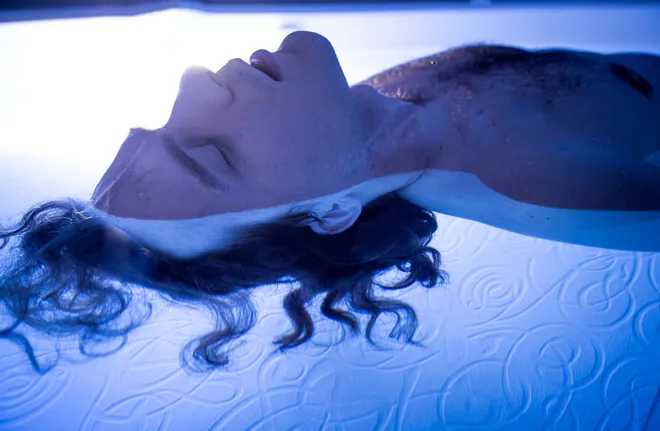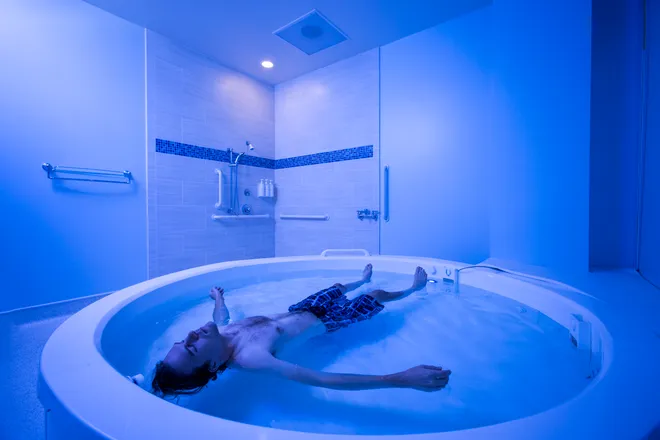I spent two hours floating naked in a dark chamber for my mental health. Did it work?
Darkness.
That's all I could see as I slowly moved my hand to feel the edge of the chamber. I'd lost track of time. Had it been 15 minutes? 30? An hour? My heart pounded as I wondered how much longer I had left.
I took a shaky breath and reminded myself why I walked naked into this 7-foot-tall chamber filled with about a foot of water and 1,250 pounds of Epsom salt. I wasn't in prison. I wasn't in some obscure reality television competition.
I was there to relax.
Sensory deprivation, or, as its proponents call it, float therapy, has grown in prominence as a wellness trend over the past decade, with big names like Stephen Curry, Jeff Bridges and Joe Rogan touting it.
Though research on its supposed benefits is sparse, some experts say floating in salt water in a dark room with nothing to see, touch, smell, taste or hear shows promise for alleviating anxiety and other mental health concerns.
A day before my two-hour session at Float Lab in Westwood, California, Justin Feinstein, a clinical neuropsychologist researching float therapy, warned it usually takes an hour of floating for relaxation to kick in.
"I hate the word sensory deprivation because I think it's a misnomer," he says, explaining it doesn't deprive you of senses, but, rather reorients them from external to internal sensations, such as your breath and heartbeat.
"The other reason I hate the term sensory deprivation is there's a long history going back over a 100 years ago of that word being equated with torture," he says. "The float experience is actually the exact opposite."

Does sensory deprivation or float therapy help anxiety?
Feinstein first came across float therapy a decade ago while working with patients suffering from severe stress and anxiety.
The practice, he says, triggers a "reflexive relaxation response," leading to reductions in blood pressure and improvements in heart rate variability. It also reduces tension in the neck and back, which is where many people hold onto stress, he says.
Anti-anxiety effects from float therapy have been observed in people with generalized anxiety, social anxiety, panic disorder, agoraphobia, post-traumatic stress disorder and anorexia, he says.
"Without any effort on the part of the floater, the nervous system and the body go into this complete state of relaxation," Feinstein says. "It basically takes all of your arousal systems, your fight or flight systems, and it reduces them down to the slowest pace possible."
As a result, he says, the nervous system gets a "reset" − something much-needed in the era of smart phones and computer screens.
"We're one of the first generations that's just been inundated with stimulation, unlike any of our ancestors," Feinstein says. "The idea of giving your nervous system a chance to step away from all that stimulation, just for an hour, could have these profound psychological benefits."

What does research say about sensory deprivation?
Feinstein's goal is to find out if float therapy is viable enough to go from a trendy wellness practice to a legitimate anxiety treatment − one that can be reimbursed by health insurance providers. Float therapy packages can cost hundreds of dollars, depending on length and frequency of sessions. As such, Feinstein heads the Float Research Collective, a non-profit dedicated to investigating the effectiveness of float therapy.
Though safety and short-term benefits seem clear, the next step, he says, is to see how these effects hold up over time, which is the focus of current research. A study published in June found the benefits of a float therapy session can last up to 48 hours.
Stephanie Sarkis, a psychotherapist specializing in anxiety, says float therapy doesn't fall within many people's budgets. Still, she says, there are cheaper ways to derive the benefits, like wearing a blindfold, earplugs or meditating.
She also says whether or not float therapy works depends on the individual and how they relax.
"Some people relax by being around stimuli, and some people relax by having less stimuli," she says. "If it works for people, that's great, but if people don't have access to it or are unable to get access to it, there's other ways that people can decrease their external stimuli."
More:'Dimple maker' trend is taking over TikTok, but could it cause permanent damage?
Do you hallucinate in sensory deprivation?
Some say they've had float sessions that went beyond typical relaxation.
Cody Collins, who manages the Westwood location of Float Lab, is one of the handful of floaters who says he's had "mystical experiences" while floating sober in the tank.
"There were some experiences that, for me, were beyond words and symbols," he says. "To articulate them is really difficult."
Though he hasn't had a similar experience himself, Feinstein says they aren't unheard of from floaters. This phenomenon, he says, is likely the result of a deep meditative state, enhanced by lack of external sensation.
"You lose track of where your body begins and where it ends," he says. "It's hard to get that anywhere else."
What does complete sensory deprivation feel like?
I did not have a mystical experience − but something strange did happen.
At some point in my session, my anxiety and nerves gave way, my usual mind-chatter quieted, and I felt totally at peace, expanding into darkness.
I don’t think I fell asleep; but, the next thing I knew, I heard Collins’ knock at the wall, meaning my two hours were up. It only felt like 30 minutes.
Afterward, I asked Feinstein about this over email. He replied floating can put the mind in a “liminal state,” one where the boundary between sleep and wake becomes blurred.
It was certainly trippy. Still, I left feeling calm. Was that because my mind was playing tricks on me? Maybe. I went into the process somewhat skeptical, but, still, I expected to feel something. Of course, my usual mind chatter trickled back into my brain over the course of the day, but I know that peace is possible.
And if it takes floating naked in a dark room to achieve it, well then, sign me up.
What is compassion fatigue?Experts say taking care of others can hurt your mental health.
Disclaimer: The copyright of this article belongs to the original author. Reposting this article is solely for the purpose of information dissemination and does not constitute any investment advice. If there is any infringement, please contact us immediately. We will make corrections or deletions as necessary. Thank you.







